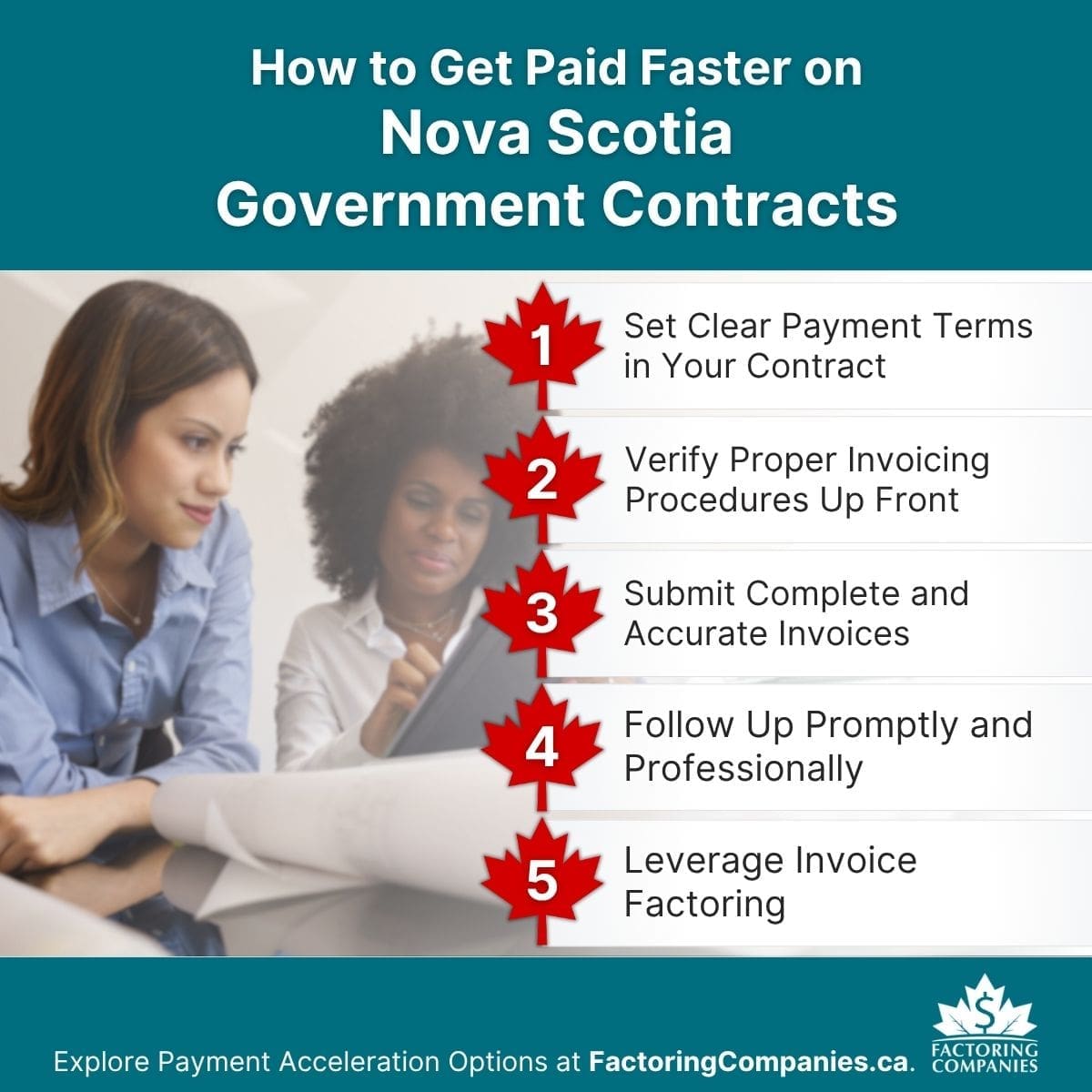
If your business works with the provincial government in Nova Scotia, knowing when you will be paid is essential for managing your cash flow. While public sector contracts can provide steady opportunities, payment practices for government contractors differ across Canada, and Nova Scotia follows its own set of procurement policies and internal processes. In this guide, you will learn what to expect when working with the province and how to speed up payment if it takes longer than planned.
Typical Payment Terms for Government Contractors in Nova Scotia
Nova Scotia’s procurement rules are set out in the Public Procurement Policy, which guides how goods and services are purchased by provincial departments and other public sector entities. While it outlines the procurement process in detail, it does not legislate a fixed payment timeline for all vendors.
In practice, many provincial contracts follow a net 30 approach, meaning payment is typically issued within 30 calendar days after both receipt of your invoice and formal acceptance of goods or services. The payment clock starts from the later of these two events.
One notable exception to the 30-day rule is construction contracts. These fall under prompt payment legislation, which stipulates a 28-day payment window.
Interest on late payments is not applied automatically. To claim it, your contract must include a clause specifying the interest rate and conditions. Without this, the province is under no obligation to pay interest on overdue amounts.
Because payment timelines are not mandated by law, it is important to review your contract before starting work to confirm when payment will be issued and whether interest applies if deadlines are missed.
Common Reasons for Nova Scotia Government Contract Payment Delays

Even with net 30 terms in place, it is common for payments to take longer than expected. In Nova Scotia, timing often depends on departmental workflows, documentation accuracy, and approval processes. Understanding the most frequent causes can help you avoid them.
Invoicing and Approval Delays
- Incorrect Submission: Sending invoices to the wrong contact or department can prevent them from entering the payment queue.
- Missing Details: Omitting purchase order numbers, reference codes, or required descriptions may result in the invoice being returned.
- Department-Specific Procedures: Each department may have unique routing and approval steps that affect timelines.
Documentation Gaps or Discrepancies
- Mismatched Information: Differences between your invoice, the purchase order, or delivery records can trigger manual reviews.
- Incomplete Records: Lack of proof of delivery or acceptance can delay formal sign-off and stall the payment clock.
- Change Orders without Documentation: Adjustments to the original scope that are not supported by written authorization can cause additional review time.
Delays in Acceptance of Goods or Services
- No Prompt Sign-Off: Payments do not begin processing until goods or services are officially accepted.
- Multiple Reviewers: If approval requires input from several people or departments, the process can stretch over weeks.
Internal Processing Cycles
- Batch Payment Schedules: Some departments may process payments only on certain dates, so missing a cut-off can add days or weeks.
- Staffing Constraints: Absences or high workloads within Accounts Payable or departmental offices can slow down invoice handling.
How to Get Paid Faster on Government Contracts in Nova Scotia

While you cannot change the province’s internal processes, you can take steps to help your invoices move through the system without unnecessary delays.
Set Clear Payment Terms in Your Contract
- Define the Payment Window Clearly: Specify how many days the province has to pay after receiving your invoice and confirming acceptance of goods or services.
- Include Interest Clauses: If you want to claim interest on late payments, outline the rate and conditions in writing.
- Clarify the Payment Trigger: State whether the clock starts on invoice receipt or upon acceptance.
Verify Proper Invoicing Procedures Up Front
- Identify the Correct Contact: Know who will review and approve your invoice before you send it.
- Verify Submission Methods: Some departments may require email submissions, while others may use a portal such as the vendor self-service system.
- Check Documentation Requirements: Ask if proof of delivery, acceptance forms, or specific codes must be included.
Submit Complete and Accurate Invoices
- Match Contract and PO Details: Ensure names, amounts, and descriptions align exactly with the purchase order and agreement.
- Attach Required Supporting Documents: Include all proof of delivery, sign-off forms, or other requested attachments.
- Double-Check Before Sending: Avoid typos or missing information that could slow approvals.
Follow Up Promptly and Professionally
- Confirm Receipt: Check that your invoice has reached the right department and entered the payment process.
- Request Status Updates: If payment is nearing its due date, contact your departmental contact to confirm it is on track.
- Provide Clarifications Quickly: Respond to any questions immediately to keep the process moving.
Factoring Invoices for Nova Scotia Government Contractors
Even when your invoices are complete and follow every procedure, Nova Scotia’s payment process can extend well beyond the 30-day target. By using factoring for government contractors, you can turn approved invoices into immediate working capital, so it’s easier to manage payroll, purchase materials, and cover operating costs while the province works through its internal approvals.
How Factoring Works for Government Contractors in Nova Scotia
With accounts receivable factoring, you sell your invoice to a factoring company. The factor advances most of the invoice value, often within one to two business days, and then collects payment from the province when it is due. Because Nova Scotia is generally considered a reliable payer, qualifying for factoring is straightforward, and rates are often competitive.
Benefits of Factoring for Nova Scotia Contractors
- Steady Cash Flow without New Debt: Factoring converts receivables into immediate cash without loans or repayment schedules.
- Simple Approval Process: Factors evaluate the creditworthiness of your government client, so even new businesses and those without strong credit often qualify.
- Flexibility to Match Your Needs: Choose spot factoring for a single invoice or factor regularly for consistent funding.
- Support for Growth: Reliable funding helps you take on more contracts without worrying about payment timing.
Types of Nova Scotia Government Contractors That Leverage Factoring
Government contracting in Nova Scotia spans a range of industries, many of which experience extended payment cycles. Factoring is commonly used by the business types outlined below.
- Construction and Infrastructure Firms: Public projects like road maintenance, bridge repairs, and building upgrades often require significant upfront spending, which is why many turn to specialised factoring for construction companies to cover materials and subcontractor costs.
- Transportation and Logistics Providers: Fuel, payroll, and vehicle upkeep can add up quickly on provincial contracts, so businesses frequently rely on factoring for trucking companies to keep cash flow steady.
- Healthcare Service Providers and Medical Suppliers: Contracts with Nova Scotia Health can involve long billing cycles, which makes healthcare factoring solutions valuable for maintaining staffing levels and equipment inventory.
- Facility Maintenance and Janitorial Companies: Cleaning crews, waste management firms, and building upkeep providers often use factoring for janitorial service companies to avoid disruptions between invoicing and payment.
- Security Services: Guard services for courthouses, public events, and government offices benefit from factoring for security guard companies to ensure payroll is met without delays.
- Technology and IT Service Providers: Delivering hardware, software, or network support on government projects can strain resources, which is why many opt for factoring for technology companies to balance operational costs.
- Professional and Technical Services Firms: Engineers, consultants, and project managers engaged on public initiatives use factoring for consultants to bridge the gap between invoice approval and payment.
Remove Bottlenecks from Your Nova Scotia Government Contractor Payments with Factoring
If long payment cycles are holding back your operations, factoring can put most of your invoice value in your hands within days. With quick approvals and flexible terms, it is a straightforward way to keep projects moving. To take the next step, request a free rate quote.
Editor’s Note: Please note that every effort has been made to ensure the accuracy of the information provided, and links to policies are included for your reference. However, contract terms are set by individual jurisdictions and are subject to change. Be sure to check with relevant regulatory bodies and your contract as needed.
FAQs on Nova Scotia Government Contract Payment Terms
Are late payments from the Nova Scotia government subject to interest?
Interest is not applied automatically. To claim it, your contract must include a clause that clearly states the rate and conditions. Without it, the province has no obligation to pay interest on overdue amounts.
How can I avoid payment delays on public contracts in Nova Scotia?
Submit invoices through the correct channel, ensure all required purchase order numbers and documentation are included, and match details exactly to the contract. Using the vendor self-service portal can also help prevent lost or misdirected invoices.
Can I get paid faster if my invoice is delayed?
Yes. Nova Scotia government contractors can use factoring to receive most of the invoice value upfront while the province completes its payment process.
Does Nova Scotia have prompt payment laws for government contractors?
No. There is no provincial prompt payment legislation for all government contracts. Payment timelines are set out in the contract and guided by the Public Procurement Policy. One exception is made for the construction industry, as prompt payment laws require projects to be paid within 28 days.
How long does it take to get paid on a government contract in Nova Scotia?
Many invoices are paid within 30 days of acceptance, but internal reviews, departmental approvals, and payment scheduling can extend the timeline. Some payments may take longer if invoices are incomplete or misrouted.
How can I find a factoring company that serves Nova Scotia government contractors?
Factoring Companies Canada can match you with a factoring company that works with Nova Scotia government contractors. Tell us a little about your business to get started.

About Factoring Companies Canada
Related Insights
Get an instant factoring estimate
Factoring results estimation is based on the total dollar value of your invoices.
The actual rates may differ.
CLAIM YOUR FREE FACTORING QUOTE TODAY!
PREFER TO TALK?
You can reach us at
1-866-477-1778
Get an instant factoring estimate
Factoring results estimation is based on the total dollar value of your invoices.
The actual rates may differ.
CLAIM YOUR FREE FACTORING QUOTE TODAY!
PREFER TO TALK? You can reach us at 1-866-477-1778











